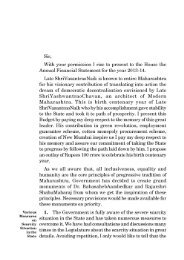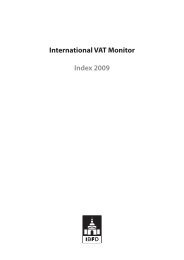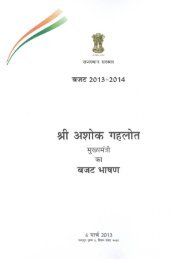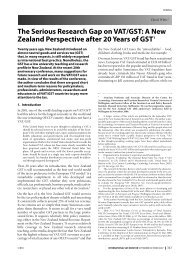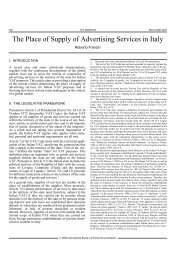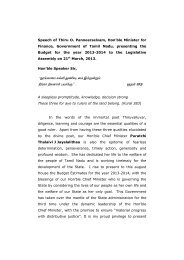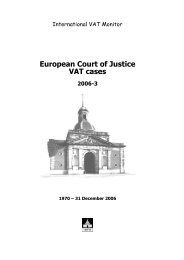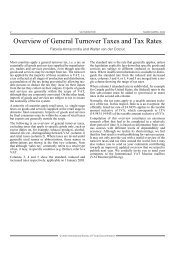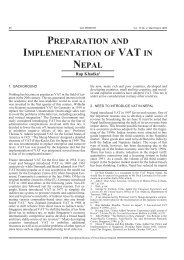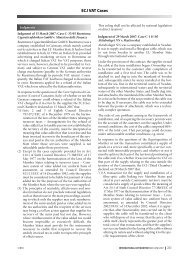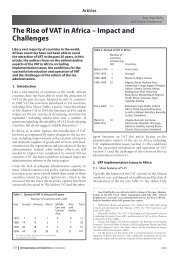The New EU Place-of-Supply Rules from a ... - empcom.gov.in
The New EU Place-of-Supply Rules from a ... - empcom.gov.in
The New EU Place-of-Supply Rules from a ... - empcom.gov.in
You also want an ePaper? Increase the reach of your titles
YUMPU automatically turns print PDFs into web optimized ePapers that Google loves.
Literal <strong>in</strong>terpretation <strong>of</strong> the new Art. 44 is also contrary<br />
to the pr<strong>in</strong>ciple that services supplied to taxable persons<br />
should be subject to VAT <strong>in</strong> the Member States <strong>of</strong> consumption.<br />
1 For those reasons, the phrase “act<strong>in</strong>g as such”<br />
<strong>in</strong> the new Art. 44 should be ignored or <strong>in</strong>terpreted so<br />
that, as long as the customer uses his VAT identification<br />
number, he is deemed to act <strong>in</strong> his capacity as a taxable<br />
person. In that respect, the supplier should not be held<br />
responsible for the application <strong>of</strong> VAT.<br />
Example<br />
A company, established and registered for VAT purposes <strong>in</strong><br />
Member State 1, carries out both taxable (manufactur<strong>in</strong>g <strong>of</strong><br />
goods) and non-taxable (passive hold<strong>in</strong>g <strong>of</strong> shares) activities. It<br />
purchases consultancy services <strong>from</strong> a consultant established <strong>in</strong><br />
Member State 2 for the purposes <strong>of</strong> its non-economic activity.<br />
If, contrary to the word<strong>in</strong>g <strong>of</strong> the new Art. 44, it is immaterial<br />
whether the customer will use the consultancy services for its<br />
economic or non-economic activities, the services are deemed<br />
to be supplied <strong>in</strong> Member State 1. If the new general B2B place<strong>of</strong>-supply<br />
rule only applies where the customer“acts as a taxable<br />
person”, the consultancy services are deemed to be supplied <strong>in</strong><br />
Member State 2.<br />
In the first case, the customer will account for VAT under the<br />
reverse charge mechanism but deduct VAT accord<strong>in</strong>g to the proportion<br />
<strong>of</strong> his turnover subject to VAT. In the second case the<br />
recipient will be obliged to recover <strong>in</strong>put VAT through the<br />
amended 8th VAT Directive. Clearly, each approach leads to a different<br />
result.<br />
<strong>The</strong> new Art. 44 provides that services rendered to a taxable<br />
person’s “fixed establishment” are deemed to be supplied<br />
at the place where the fixed establishment is<br />
located. For the issues surround<strong>in</strong>g the concept <strong>of</strong> fixed<br />
establishment, see .2.<br />
In this respect, special attention should be given to the<br />
person mentioned on the order form, the person to<br />
whom the <strong>in</strong>voice is sent and the person who will actually<br />
pay for the service. In pr<strong>in</strong>ciple, the “bill-to” entity<br />
should be considered the recipient <strong>of</strong> the service. However,<br />
it <strong>of</strong>ten occurs <strong>in</strong> practice that <strong>in</strong>voices are sent to a<br />
commercial group’s central “bill<strong>in</strong>g po<strong>in</strong>t”, which, subsequently,<br />
recharges the costs to various entities <strong>of</strong> the<br />
commercial group; this may make it difficult for the<br />
service provider to determ<strong>in</strong>e who actually benefits <strong>from</strong><br />
the service. Such an attribution would impose a high<br />
adm<strong>in</strong>istrative burden on service providers, which<br />
would not be <strong>in</strong> l<strong>in</strong>e with the aim <strong>of</strong> Directive 2008/8. 14<br />
Example<br />
A management company, established and registered for VAT<br />
purposes <strong>in</strong> Member State 1, sends an <strong>in</strong>voice to the head <strong>of</strong>fice<br />
<strong>of</strong> a commercial group established <strong>in</strong> Member State 2 for management<br />
services. <strong>The</strong> head <strong>of</strong>fice recharges these costs to its<br />
fixed establishment, which is established <strong>in</strong> Member State 1.<br />
If the head <strong>of</strong>fice is considered to be the recipient <strong>of</strong> the services,<br />
the management services are deemed to be supplied <strong>in</strong> Member<br />
State 2. On the other hand, if the fixed establishment is considered<br />
to be the actual recipient <strong>of</strong> the services, the management<br />
services are deemed to be supplied <strong>in</strong> Member State 1.<br />
In Syndicat des Producteurs Independents, 1 the ECJ has<br />
ruled that the charg<strong>in</strong>g on <strong>of</strong> a supply consists <strong>of</strong> two dis-<br />
© IBFD INTERNATIONAL VAT MONITOR MARCH/APRIL 2009<br />
Articles<br />
t<strong>in</strong>ct supplies <strong>of</strong> services and that the only relevant criterion<br />
is the nature <strong>of</strong> the service provided. On the basis <strong>of</strong><br />
that decision, it could be argued that, for practical reasons,<br />
the actual recipient <strong>of</strong> a service is the person who<br />
fulfils two <strong>of</strong> the follow<strong>in</strong>g three criteria: he ordered the<br />
service, receives the related <strong>in</strong>voice and pays the service<br />
provider. In addition, where that recipient has multiple<br />
fixed establishments <strong>in</strong> the European Union, the service<br />
provider should not be required to determ<strong>in</strong>e whether<br />
the services are effectively recharged to those establishments.<br />
4.2. Services connected with immovable property<br />
Under the new Art. 47, services connected with immovable<br />
property, <strong>in</strong>clud<strong>in</strong>g:<br />
– the services <strong>of</strong> experts and estate agents;<br />
– the provision <strong>of</strong> accommodation <strong>in</strong> the hotel sector<br />
or <strong>in</strong> sectors with a similar function, such as holiday<br />
camps or sites developed for use as camp<strong>in</strong>g sites;<br />
– the grant<strong>in</strong>g <strong>of</strong> rights to use immovable property;<br />
and<br />
– services for the preparation and coord<strong>in</strong>ation <strong>of</strong><br />
construction work, such as the services <strong>of</strong> architects<br />
and <strong>of</strong> firms provid<strong>in</strong>g on-site supervision<br />
are deemed to be supplied at the place where the immovable<br />
property is located. That rule is basically the same as<br />
that laid down by the current Art. 4 .<br />
In order to apply this article correctly, the term “services<br />
connected with immovable property” should clearly be<br />
dist<strong>in</strong>guished <strong>from</strong> services which fall with<strong>in</strong> the scope<br />
<strong>of</strong> the general B2B place-<strong>of</strong>-supply rule laid down by the<br />
new Art. 44.<br />
Example<br />
A consultancy firm, established and registered for VAT purposes<br />
<strong>in</strong> Member State 1, provides tax and legal advice to a landlord,<br />
established and registered for VAT purposes <strong>in</strong> Member State 2,<br />
<strong>in</strong> respect <strong>of</strong> the lett<strong>in</strong>g <strong>of</strong> a build<strong>in</strong>g located <strong>in</strong> Member State 3.<br />
If these services are considered to be connected with the<br />
immovable property, the consultancy services are deemed to be<br />
supplied <strong>in</strong> Member State 3, i.e. where the immovable property<br />
is located. If they are not considered to be connected with the<br />
immovable property, the consultancy services are deemed to be<br />
supplied <strong>in</strong> Member State 2, i.e. where the recipient <strong>of</strong> the services<br />
is established.<br />
Questions <strong>of</strong> whether services are connected with<br />
immovable property can also arise <strong>in</strong> respect <strong>of</strong>, <strong>in</strong>ter<br />
alia, construction <strong>of</strong> a scale model <strong>of</strong> a build<strong>in</strong>g to be<br />
constructed, an unsuccessful attempt <strong>of</strong> a taxable person<br />
to f<strong>in</strong>d a suitable build<strong>in</strong>g or build<strong>in</strong>g site for another<br />
taxable person, removal and disposal <strong>of</strong> waste produced<br />
at an immovable property, design <strong>of</strong> a standard concept<br />
for retail outlets which never reach the stage <strong>of</strong> construction,<br />
security and surveillance services, etc.<br />
1 . Recital (4) <strong>of</strong> the preamble to Directive 2008/8.<br />
14. Id.<br />
1 . ECJ judgment <strong>of</strong> 1 March 2001 <strong>in</strong> Syndicat des Producteurs Indépendants<br />
(SPI) v. M<strong>in</strong>istère de l’économie, des f<strong>in</strong>ances et de l’<strong>in</strong>dustrie (France), Case<br />
C-108/00, [2001] ECR I-2 1.<br />
10



